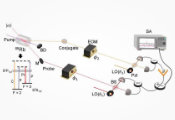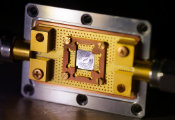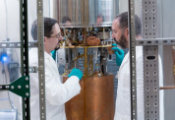Nima Lashkari Awarded Templeton Foundation Grant to Study How Time Emerges From Quantum Chaos
July 24, 2025 -- Nima Lashkari, an assistant professor of physics at Purdue University, has been awarded a $1.5 million grant from the John Templeton Foundation to explore how time might emerge from chaotic quantum systems.
Lashkari serves as the lead principal investigator and will receive $390,000 of the funding. The project runs from September 2025 through August 2028 and includes collaborators Hong Liu, a physicist at the Massachusetts Institute of Technology; Sebastian de Haro, a philosopher and physicist at the University of Amsterdam; and Richard Dawid, a philosopher at Stockholm University. Lashkari notes that this project is deeply theoretical, yet it relies on close collaboration across multiple institutions.
The project, titled "Emergence of Time from Chaos in Operator Algebras," brings together experts in quantum gravity, operator algebras and the philosophy of physics to tackle fundamental questions about time, spacetime and the laws of nature.
"While time is one of the most familiar yet mysterious dimensions of our existence, recent insights from quantum gravity reveal it may not be as fundamental as we think," Lashkari said.
The research will explore how chaotic behavior within operator algebras can give rise to our experience of time and spacetime symmetries, with applications ranging from black hole physics to holographic theories.
"A novel collaboration between theoretical physicists and philosophers of science is made possible by a common rigorous mathematical language called operator algebras," Lashkari said. Operator algebras are a branch of mathematics that studies algebras of linear operators, often on infinite-dimensional vector spaces.
The interdisciplinary project includes three components:
- 1. Exploring how chaos in operator algebras generates concepts of time, with implications for black hole physics and holographic theories.
- 2. Investigating the emergence of time as experienced by observers in extreme environments such as black hole singularities and cosmological spacetimes.
- 3.Examining the philosophical implications of how time might emerge as a real feature without being fundamentally built into the fabric of the universe.
Lashkari's broader research program focuses on using operator algebras and quantum information theory to understand the emergence of spacetime in quantum gravity and uncover new phenomena in strongly coupled quantum field theories.
"My very recent work has been focused on using quantum chaos and non-commutative ergodic hierarchies to provide an operator algebraic description of quantum spacetime in low dimensions and highly symmetric cases," Lashkari said. "My goal is to generalize this to higher dimensions and more general spacetimes, including black holes and cosmological spacetimes."
The funding will also support the hiring of a postdoctoral researcher and new students for Lashkari's group. Lashkari is also a member of the Purdue Quantum Science and Engineering Institute.




































